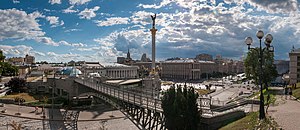Beljashanan
Beljashanan
Beljaśanan Бэлйaшaнaн Ⰱⰵⰾⰻⰰⱎⰰⱀⰰⱀv | |
|---|---|
Capital city | |
(Clockwise from the top) Independence Square, Sokolov University Building, House with Chimaeras, Merinskji Palace, St. Olga Cathedral, Beljashanan-Pekeraska Lavra | |
| Nickname: Mother of All Olsahemobka | |
| Motto: "God is with us" | |
| Country | Olsahemobka |
| Grand Municipality | Beljashanan |
| Government | |
| • Body | Beljashanan City Council |
| • City Mayor | Bohdan Zelenahoraski (R) |
| Population | |
| • Total | 1,131,285 |
| Area code | +88 50 |
| Website | beljashanancity.gov.vo |
Beljashanan is the capital and most populous city of Olsahemobka. It is in south-central Olsahemobka at the mouth of the Oljena River. As of 1 September 2020, its population was 1,131,285. Beljashanan is an important industrial, scientific, educational, and cultural center in Olsahemobka and to a lesser extent in Ausiana. It is home to many high-tech industries, higher education institutions, and historical landmarks. The city has an extensive system of public transport and infrastructure, including the Beljashanan Metro.
Etymology
The origins of the name 'Beljashanan' has been disputed and hypothesised. The earliest written record of Beljashanan is in the Primary Chronicle where it is mentioned as Bielyasyahan. Though the first segment 'Belja' is certainly derived from the Proto-Slavic *bě̃lъ meaning "white", the second segment '-shanan' has unknown origins. Historian and anthropologist Jeremy J. Richards proposed that it evolved from the Scathian *frakāna meaning "leader, chief" with the land named after an important local Scathian chief; another theory suggests that it developed from the Apsavestan dānu- meaning "river" - which is the same origin as the name for the Dan river - and a third theory presents that is a corruption of the Proto-Erenic word *xšáyati meaning "king", sharing the same hypothesis as the first theory, though the most widely accepted is the theory that it originates from the Proto-Slavic *stěna, meaning "conglomeration (of stones), lump, rock, wall", possibly describing a collection of white stones that were utilised as a pagan shrine.





